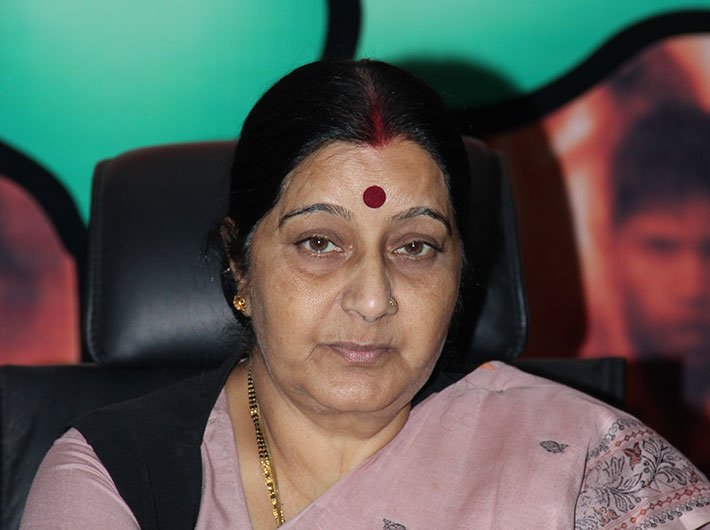Terror will dominate New Delhi’s talks with Beijing and Moscow, while strategic issues will be discussed when India, Japan and Australia meet
This is a crucial month for India’s foreign policy makers as two back-to-back trilateral meetings, one at the ministerial level and another at the foreign secretary level, are going to be held on December 11 and December 12 in New Delhi. While terrorism issue will dominate the Russia-India-China meet, the India-Japan-Australia meet would be dominated by strategic issues, say high placed sources.
After much persuasion by India, Chinese foreign minister Wang Yi agreed to participate in the India-Russia-China trilateral talks in December. The three-nation talks were scrapped in April after Beijing refused to send its foreign minister to India when it allowed Tibetan spiritual leader the Dalai Lama to visit Arunachal Pradesh. It was not too keen that the talks be held in December. It wanted the RIC talks to be held some time early next year, but India was bent on holding it this year itself so that it could escape from any future criticism on the foreign policy front. Now that this arrangement’s 15th meeting is going to be held on December 11 in New Delhi, India has decided to make terrorism a priority in its agenda.
Sources say India wants China and Russia to translate the pledge to form counter-terrorism front, with the UN playing a central role in it, into a reality. For the past several years, it has been seen that what has been agreed on terrorism issue at the BRICS or the SCO level has never been implemented. Instead of having a united stand on counter terrorism front together with India and Russia, China’s position on the issue has been “erratic and unpredictable”.
During the BRICS summit in Xiamen in September, China had agreed to be part of the declaration that expressed concern on violence caused by Pakistan-based terrorist groups like Jaish-e-Mohammad and Lashkar-e-Taiba in the South Asian region, but by November its tune changed. It blocked yet another attempt by the US, the UK and France to list Jaish-e-Mohammad chief and Pathankot terror attack mastermind Masood Azhar as a global terrorist by the UN, stating that there is no consensus over it.
India, it is said, will impress upon China and Russia to implement the resolution of last year’s RIC meet on terrorism. Also, India together with Russia is eager to see that RIC branches out to defence, economic and homeland security field. In April 2017, Moscow mooted an idea of having defence minister- level meet among the three countries. India had endorsed it, but China rejected it. Post Doklam, distrust between India and China has only increased. New Delhi has, under its anti-dumping measure, barred around 100 Chinese goods from entry into India. Given this, India will use Russia’s good offices to bring China on board the issue of having a separate trilateral economic ministers’ level meet.
But most of specific issues, including those related to trade and commerce, will be raised during bilateral talks that external affairs Minister Sushma Swaraj will hold separately with Russian and Chinese counterparts on the sideline of the RIC meet. On regional issues, it is likely that the three ministers will discuss about North Korea, Afghanistan, Syria and Iraq. Of them, talks on North Korea and Afghanistan will be crucial.
Sources say India is not happy with the way Russia and China have conducted their strategy regarding Afghanistan. “Even though we acknowledge Russia’s concern about presence of ISIS in Shirzad and Achin districts of Nangarhar province and other areas of the land locked nation, but we don’t know why Russians should be kind towards the Taliban. China is also following the same Russian move. Afghans are against any unconditional talks with the Taliban and so are we. Therefore, Russia and China should avoid creating any confusion over Afghanistan,” said a senior level officialrequesting anonymity.
Yet an overall attempt by India is to make its relations with Russia and China strong and effective. India may like China to use its deeper contacts with Pyongyang to prevent the Korean peninsula from becoming volatile and risky. Overall, the forthcoming RIC meet will be a highly watched affair. Diplomats and foreign experts would beparticularly keen to see that joint communique issued after the meet takes into account OBOR and the South China issue.
Nonetheless, December is crucial month for India and China. Soon after the trilateral meet, New Delhi and Beijing will hold border talks, a first since the 73-day faceoff at Doklam. India’s NSA and special representative on border talks, Ajit Doval will hold talks with China’s Yang Jiechi, the state counsellor.
Similarly, the impending India, Japan and Australia joint secretary level meet will be highly significant given the fact that Washington and Tokyo are pushing for a quad involving India-US-Japan-Australia for their common strategic interests in the Asia-Pacific region. Interestingly, officials of India-US-Japan-Australia had held their first quadrilateral talks in 2007. This year too, the four countries conducted their talks on the sidelines of the ASEAN and the East Asia summits in Manila on November 14. Since the Donald Trump administration is pressurising India to include Australia in the next Malabar series of naval exercises, it has to be seen how the forthcoming foreign secretary level talks between India, Japan and Australia shapes up. So far, India is disinterested about including the Australian navy into the next Malabar naval exercise which will be held in the Indian Ocean. Reason for this stubborn resistance by India, lies in the China factor; by making Australia a part of the Malabar series of naval exercise, New Delhi doesn’t want to stir up tension with China. But then in the fast changing geo-political situation, nothing is fixed and final, a hint India is likely to give Australia when foreign secretaries of the three countries sit together on December 12.

